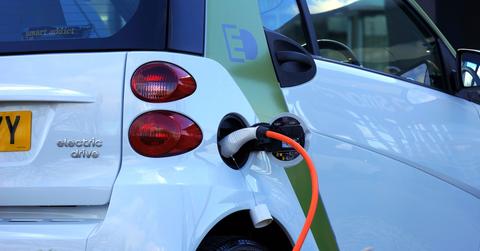Utility Companies Are Now Offering Rebates For Electric Vehicle Sales
You’ve heard of state and federal rebates for hybrid and electric vehicles, and for installing solar panels on your roof. But now utility companies are jumping into the ring by offering rebates of their own, in order to help boost the electric vehicle market.
Updated May 17 2019, 1:07 p.m. ET
You’ve probably heard you can get state and federal rebates when you purchase hybrid and electric vehicles, along with rebates if you install solar panels on the roof of your home. But now utility companies are jumping into the ring by offering rebates of their own, in order to help boost the electric vehicle market and encourage customers to become more environmentally friendly.
Utility companies ultimately benefit by offering rebates.
When you buy an electric vehicle, you’ve got to charge it. And that costs the average person $600 per year in electricity costs, paid directly to utility companies in most cases (unless of course you’ve solved that problem by charging your car with solar panels).
It makes fiscal sense, then, that electric companies in Vermont and California have begun offering customers $450 to $1,200 off their electric bills when they buy a rechargeable car. Meanwhile, the Vermont Electric Cooperative has partnered with Nissan to offer $10,000 in rebates.
But that’s just part of the angle.
The electric vehicles market needs a serious push.
Electric vehicles barely account for 1 percent of the vehicle market in the United States. Attempts to increase that market have included a number of benefits and tax credits, including the current $7,500 federal tax credit, reduced charging rates, and local incentives like access to carpool lanes and free parking.
Utilities offering these rebates are primarily motivated by climate goals, not bottom lines, Scientific American reports. Electric companies are under pressure to meet legislation mandating emissions reductions. In Vermont, legislation signed in 2015 sought to increase clean power and forces utilities to meet these goals by investing money in clean grid energy and expanded electric vehicle sales. Failure to comply will result in a utility company having to pay into a state fund.
“There are a lot of levers we could potentially pull here,” Kellen Schefter, manager of sustainable technology at the Edison Electric Institute, a trade group that represents 70 percent of the electricity industry, told Scientific American. “Education, outreach, infrastructure — that's what our companies are comfortable addressing, because they are infrastructure companies,” he said. The institute predicts there will be 7 million electric vehicles on American roads by 2025, and underscores the importance of expanding charging stations and incentives for buyers.
States need to find new ways to meet emissions standards.
In California, Pacific Gas and Electric Co., Southern California Edison Co. and San Diego Gas and Electric Co. (the state’s three largest investor-owned utilities) are currently offering credits from $200 to $500 for customers with electric vehicles. Elsewhere, Kansas City Power & Light Co. and the Hawaiian Electric Co. have in the past partnered with Nissan with similar incentives.
Throughout the country, 11 states have signed onto California's zero-emission vehicle mandate, part of which angles to inflate sales by seven to 15 times to meet requirements. Ultimately, utilities companies are hoping their incentives will help to push the EV market where it needs to go.
